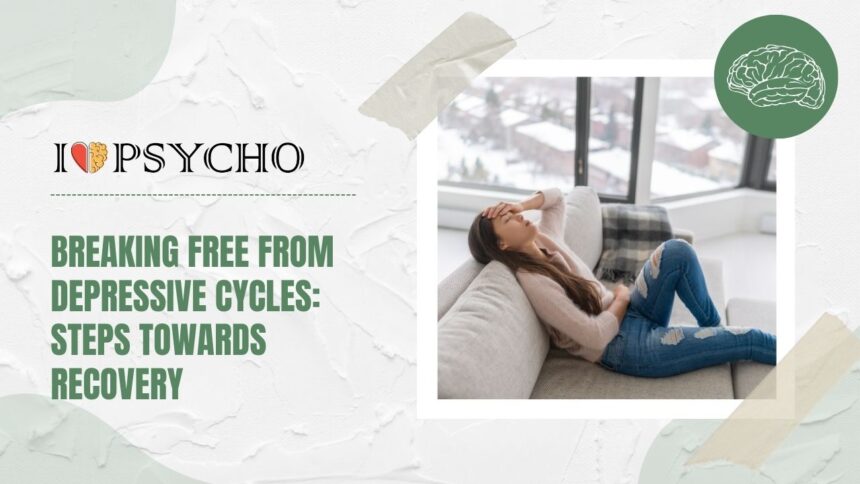Feeling trapped in the relentless cycle of depression can be like trying to break free from quicksand. It pulls you down, making each step feel heavier than the last. But here’s the thing – recovery is not only possible but within reach. By understanding the patterns, identifying triggers, seeking help, and developing healthy habits, you can navigate your way out of the darkness towards a brighter tomorrow. Let’s embark on this journey together as we explore how to break free from depressive cycles and reclaim your life.
Understanding Depression and its Cycles
Depression is not just feeling sad or down; it’s a complex mental health condition that can impact every aspect of your life. It involves a persistent feeling of emptiness, hopelessness, and despair that seems to have no end in sight. Understanding depression means recognizing that it often follows cyclical patterns, where periods of intense sadness and low energy alternate with brief moments of relief.
These cycles can vary in duration and intensity from person to person, making it crucial to pay attention to your own unique experience. By becoming aware of these patterns, you can start to identify triggers – whether they are external stressors, negative thought patterns, or unresolved past traumas – that contribute to the onset or exacerbation of depressive episodes.
Recognizing these cycles and triggers is the first step towards breaking free from their grip and taking control of your mental well-being.
Identifying Triggers and Patterns
Understanding the triggers and patterns that contribute to depressive cycles is a crucial step towards breaking free from their grasp. These triggers can vary from person to person, ranging from stressful life events to certain environments or even specific thoughts and emotions. By paying close attention to these triggers, we can start unraveling the patterns that perpetuate our negative mental states.
It’s important to keep a journal or log of your moods, activities, and thoughts to identify common themes or situations that tend to trigger your depressive episodes. Look for recurring patterns or behaviors that may be exacerbating your feelings of sadness or hopelessness.
Once you’ve pinpointed these triggers, you can begin strategizing on how best to avoid them or cope with them when they arise. This self-awareness is key in taking control of your mental health and steering yourself towards a path of recovery.
Seeking Professional Help
Seeking professional help for depression is a crucial step towards recovery. It’s normal to feel hesitant or unsure about reaching out, but remember that mental health professionals are trained to provide support and guidance tailored to your specific needs. Therapists can help you explore the root causes of your depressive cycles and develop effective coping strategies.
Don’t be afraid to ask for help – seeking therapy doesn’t mean you’re weak, it means you’re taking control of your well-being. Whether it’s through counseling, medication, or a combination of both, professional intervention can make a significant difference in managing your symptoms and improving your quality of life.
Remember that therapists offer a safe space for you to express yourself without judgment. They can assist you in challenging negative thought patterns and beliefs that contribute to your depression. Building a strong therapeutic relationship with a mental health professional can empower you on your journey towards healing and breaking free from depressive cycles.
Developing Coping Mechanisms
When facing the challenges of depression, developing coping mechanisms is crucial. These strategies can help you navigate through difficult emotions and situations. One effective coping mechanism is mindfulness meditation, which allows you to focus on the present moment and increase self-awareness. Engaging in physical activities like yoga or exercise can also boost your mood and reduce stress levels.
Journaling your thoughts and feelings can be a therapeutic outlet for processing emotions. Additionally, practicing deep breathing exercises can help calm your mind during moments of distress. Surrounding yourself with positive influences such as supportive friends or engaging in hobbies that bring joy can provide a much-needed mental escape.
Remember, coping mechanisms are unique to each individual, so it’s important to explore different techniques until you find what works best for you.
Incorporating Healthy Habits into Daily Routine
Incorporating healthy habits into your daily routine can play a significant role in breaking free from depressive cycles. Start by setting small, achievable goals for yourself each day. Whether it’s going for a walk, preparing a nutritious meal, or practicing mindfulness, these little steps can make a big difference.
Make sure to prioritize self-care and allocate time for activities that bring you joy and relaxation. This could include reading a book, taking up a hobby, or simply spending quality time with loved ones.
Exercise is also crucial in promoting mental well-being. Find an activity that you enjoy and make it a regular part of your routine. Physical movement not only boosts endorphins but also helps reduce stress and anxiety.
Additionally, paying attention to your sleep patterns and ensuring you get enough rest is essential for overall mental health. Create a bedtime routine that promotes relaxation and good sleep hygiene practices.
Remember, incorporating healthy habits takes time and consistency. Be patient with yourself as you work towards building a sustainable lifestyle that supports your mental wellness.
Challenging Negative Thoughts and Beliefs
Challenging negative thoughts and beliefs is a crucial step towards breaking free from depressive cycles. It involves recognizing the harmful narratives we tell ourselves and questioning their validity. By challenging these thoughts, we can begin to shift our perspective and create space for more positive thinking.
One way to challenge negative thoughts is by examining evidence that supports or contradicts them. Often, we find that our beliefs are based on assumptions rather than facts. By actively seeking out evidence to the contrary, we can start to weaken the hold of negativity on our minds.
It’s also essential to practice self-compassion during this process. Instead of berating ourselves for having negative thoughts, we should approach them with kindness and understanding. Remember, it’s okay to struggle – what matters is how we choose to respond.
By consistently challenging negative thoughts and beliefs, we can rewire our brains towards a more optimistic outlook. This takes time and effort but can ultimately lead to profound changes in how we perceive ourselves and the world around us.
Finding Support Systems and Building a Strong Support System
Navigating through the challenges of depression can be overwhelming, but you don’t have to go through it alone. Building a strong support system is crucial in this journey towards recovery. Surround yourself with people who uplift and encourage you, whether it’s friends, family, or support groups.
Sharing your feelings and experiences with someone who understands can provide comfort and validation. It’s important to communicate your needs clearly to those around you so they can offer the right kind of support. Remember that seeking help is not a sign of weakness but rather a courageous step towards healing.
In addition to personal connections, consider professional help such as therapy or counseling. A trained therapist can provide guidance and strategies tailored to your specific needs. Online resources and helplines are also valuable tools for reaching out when needed.
Remember, building a solid support system takes time and effort but investing in these relationships will pay off in times of need. Surround yourself with positivity and understanding as you continue on the path towards breaking free from depressive cycles.
Maintaining Progress and Preventing Relapses
Maintaining progress and preventing relapses is crucial in the journey towards recovery from depression. Consistency is key in staying on track with your mental health goals. It’s important to continue practicing the coping mechanisms you’ve learned, even when things are going well.
Regularly check in with yourself to monitor any signs of a potential relapse. Recognizing these early warning signs can help you take proactive steps to prevent a setback. Stay connected with your support system and don’t hesitate to reach out for help if needed.
Incorporate self-care activities into your daily routine to nurture your emotional well-being. Whether it’s meditation, exercise, or simply taking time for yourself, prioritize activities that bring you joy and relaxation. Remember that setbacks are a natural part of the recovery process – be kind and patient with yourself as you navigate through them.
By staying diligent in maintaining healthy habits, seeking support when necessary, and being mindful of triggers, you can empower yourself to sustain progress and minimize the risk of relapses.
Conclusion
Breaking free from depressive cycles is a journey that requires dedication, self-awareness, and perseverance. By understanding depression and its cycles, identifying triggers, seeking professional help, developing coping mechanisms, incorporating healthy habits into your daily routine, challenging negative thoughts and beliefs, finding support systems, and maintaining progress consistently – you can take positive steps towards recovery. Remember that it’s okay to seek help and lean on others for support along the way. You deserve happiness and peace of mind. Keep moving forward on your path to healing.







